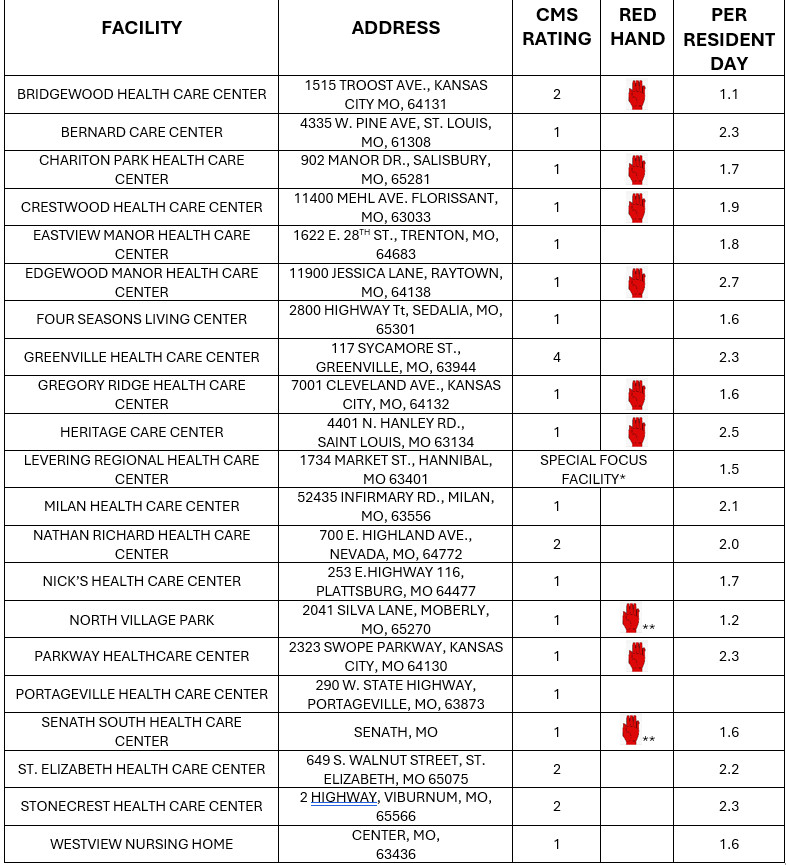By:
Dave Kingsley

The data analytics system we have developed at the Center for Health Information & Policy (CHIP) – our nonprofit research organization – gives us the capability to drill into our extensive data on the nearly 15,000 skilled nursing and long term care facilities in the U.S. We feel confident that we have identified the bottom of the bottom dwellers and need to bring them to the attention of other professionals and the public. We are curious about why a chain like the one described in this post is allowed to operate with impunity.
RELIANT HEALTH CARE, LLC: AN EXTREMELY LOW PERFORMING MISSOURI NURSING HOME CHAIN
Reliant Care Management, LLC owns 21 Medicare & Medicaid funded skilled nursing facilities in the State of Missouri – four are in the Kansas City Metropolitan Area. In our work across the United States in cities, counties, states, and regions, we have not encountered a chain with lower federal ratings on quality of care. In this alert, we will lay out the case for a high level of concern among families, ministers, social workers and others who might have an occasion to find a skilled nursing facility for a loved one or a client.

LOOK FOR THE RED HAND
The Center for Medicare & Medicaid Services as the federal regulatory agency for Medicare and Medicaid funded skilled nursing has a complicated rating system for each facility that ranges from l for low performing facilities to 5 for high performing facilities. Facilities with a rating plus a red hand have incidents that present a danger to patients. It is rare for a chain of even a few facilities to have more than one red hand. Nevertheless, of the 21 Reliant facilities 9 have a red hand (see table below).
Red hands are signs of poor quality of care. In addition to incidents that place patients in immediate jeopardy, ongoing neglect often occurs due to a lack of adequate staffing. Nursing staffing is measured by the number of nursing hours per resident day (HPRD). The current average of the 14,516 skilled nursing facilities in our data file is 3.8 (3 hours & 48 minutes) HPRD for RN, LPN, and CNA staffing – which most experts agree is far too low. Nevertheless, nursing homes with an HPRD of 2 or less are quite rare – only 7 tenths of 1 percent or 103 out of 14,516 facilities.
As the table below illustrates, the hours per resident day column indicates that Reliant facilities are extremely understaffed (“HOURS” was somehow deleted from the column – it should be “HOURS PER RESIDENT DAY”). Indeed, HPRDs in the low 2s and 1s for an entire chain is appalling.

*According to CMS, a Special Focus Facility has, “More problems than other nursing homes (about twice the average number of deficiencies),” More serious problems than other nursing homes,” and “A pattern of serious problems that have persisted over a long period of time.”
**Special Focus Candidates:” Not quite bad enough to be a Special Focus Facility yet but moving in that direction. It is truly phenomenal to see a chain of this size with one SFF and two SFF candidates.
THE NURSING HOME CLASS DIVIDE AND THE RELIANT BUSINESS MODEL
If you’ve seen one nursing home, you’ve seen one nursing home. If you’ve seen one nursing home chain, you’ve seen one nursing home chain. If you’ve seen one state nursing home system, you’ve seen one state nursing home system. Nevertheless, similarities in patterns and practices can be seen in the SKN/LTC system. For instance, some chains accept Medicare but not Medicaid, some accept Medicaid and Medicare, some have very little Medicaid while others have mostly Medicaid as a payor. The amount of contract labor used, and the price paid for it varies from chain to chain and so forth.
With 90 percent of its bed days reimbursed by Medicaid, Reliant has an extremely high number of patients who are in long-term care and too poor to pay out of pocket. The company runs mostly large facilities (120-250 beds) and a small proportion of small facilities (approximately 60 beds). Bed size varies between and within chains. However, the pattern we see is this: the larger facilities in number of beds tend to be in poorer neighborhoods and serve a disproportionate number of Medicaid patients. We have also noticed that these “big” facilities with mostly Medicaid bed days tend to be rated lower in CMS Nursing Home Care Compare quality measurement system.
Some Significant Reliant Financial Information:
- Average bed size of 113.5 (versus 90 nationwide but Reliant has a mix of a few small and very large facilities).
- Patient revenue: $161.6 million
- Net operating income: $3.3 million
- Payments to Home Office & Wholly Owned Subsidiaries: $28.8 million
- Reliant owned businesses supplying goods and services: management, therapy, pharmaceuticals, medical supplies, laundry subsidiaries (real estate side of the business is unknown at this time due to a lack of information)
- All therapy services are contracted out to Reliant owned therapy subsidiary
- Reduced labor costs through extreme low staffing and below average wages
WHO OWNS RELIANT CARE MANAGEMENT, LLC AND WHAT ARE OFFICIALS AND AUTHORITIES DOING ABOUT THIS CHAIN?
According to CMS ownership records, Reliant is owned by one individual – Mr. Rick DeStefane (see, e.g.: Find Healthcare Providers: Compare Care Near You | Medicare). Information (perhaps PR and propaganda) about Mr. DeStefane can be found on the Reliant website (Rick DeStefane | Reliant Care Management, LLC | St. Louis). We cannot be a judge of Mr. DeStefane’s character. We can only ask why his SKN/LTC facilities are rated lower than even some of the most scurrilous chains we have analyzed.
We would also ask Mr. DeStefane to show the taxpaying public Reliant’s consolidated financial reports, e.g. income statement, balance sheet, and cash flow statement. We have no idea the extent of personal wealth accruing to Mr. DeStefane and his family’s assets but we believe that the public has the right to know. Our federal and state governments have failed the public by allowing nursing home providers to hide their finances.
What are Missouri and federal legislators and regulators planning to do about Reliant? Are they even tuned into the ratings discussed in this bulletin? What are local politicians, health departments, ministerial alliances, and other individuals and organizations with an obligation to protect the vulnerable aging and disabled populations with a need for institutional nursing care doing about Reliant? Certainly, it is not OK to allow nursing homes this bad to operate below the radar.
